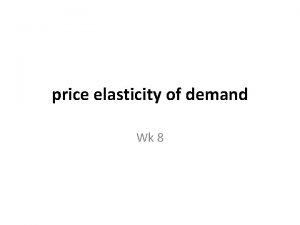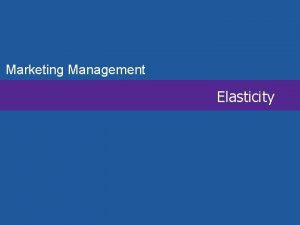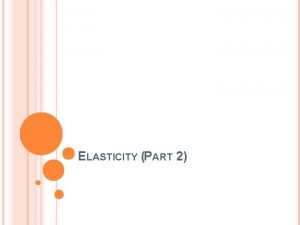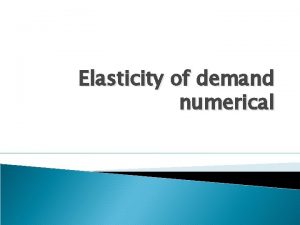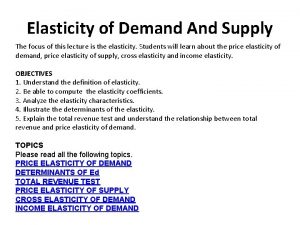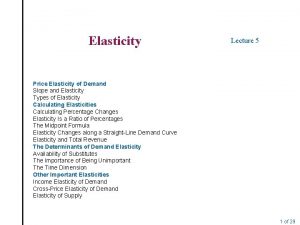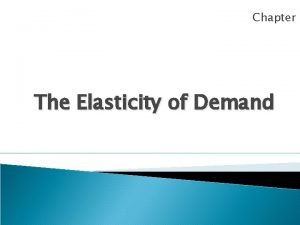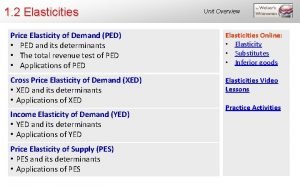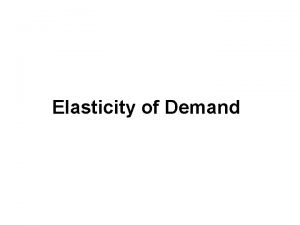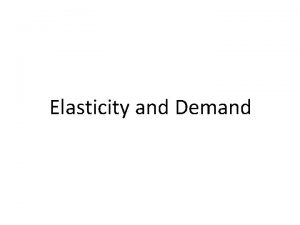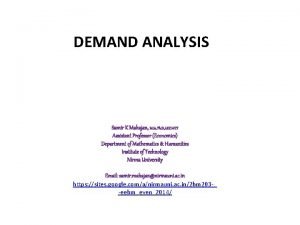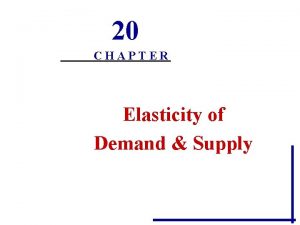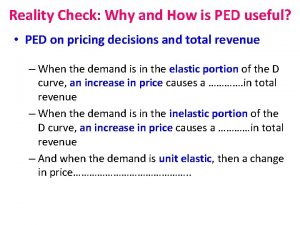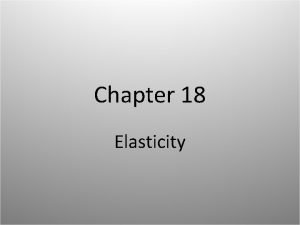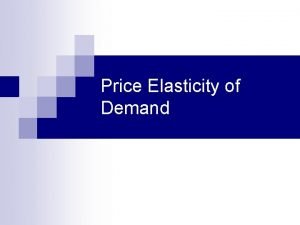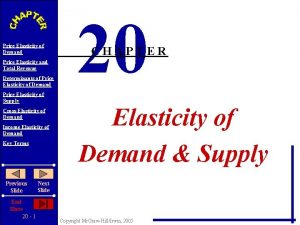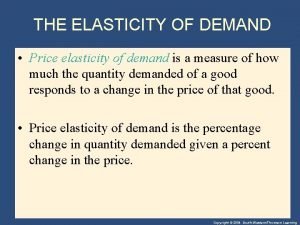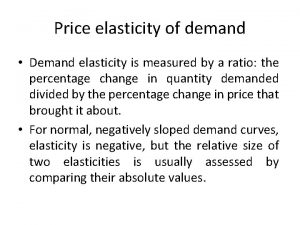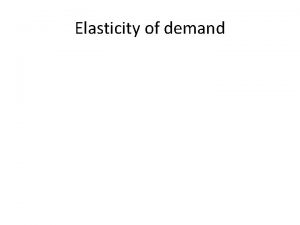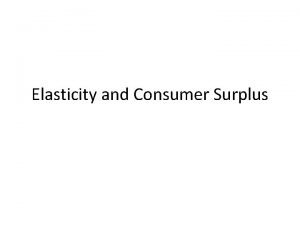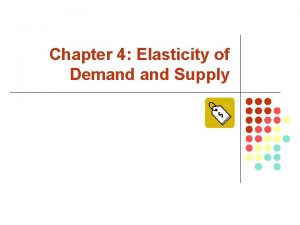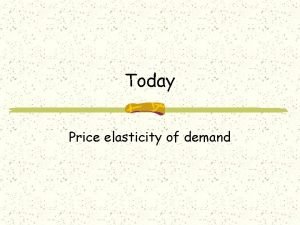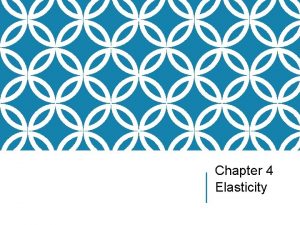Chapter 4 Elasticity Price elasticity of demand The
















- Slides: 16

Chapter 4: Elasticity Price elasticity of demand – – The percentage change in quantity demanded in response to one percent change in price; – Measure of sensitivity of quantity demanded to changes in price. An Example: – When the price of gasoline increases by 1%, the quantity demanded of gasoline decreases by 0. 5%. Therefore, the price elasticity of demand of gasoline is – 0. 5. – To what extent would a tax on gasoline help reduce environmental pollution? 1

Price Elasticity of Demand Calculate price elasticity of demand – ε= Percentage change in quantity demanded Percentage change in price • Price elasticity of demand is always negative; • In practice, we take the absolute value of . 2

Price Elasticity of Demand >1 Elastic =1 Unit elastic <1 Inelastic An example: Demand for season ski passes Old New % Change Price $400 $380 5% Quantity 10, 000 12, 000 20% ε= 20% 5% =4 Demand is elastic 3

Determinants of Price Elasticity of Demand • Substitution options: more options, more elastic; • Budget share: higher the share, more elastic; • Time horizon: longer the time, more elastic; • Necessity: more necessary, more elastic; • Breadth of definition: broader, less elastic. 4

Price Elasticity of Demand Green peas Restaurant meals Beer Coffee 2. 80 1. 63 1. 19 0. 25 Automobiles Foreign air travel 1. 35 0. 77 Movies Theater, opera 0. 87 0. 18 5

Price Elasticity: A Graphical View ε= ΔP / P P Q Price ε= ΔQ / Q P ΔQ x A ΔP ΔP P–ΔP ΔQ D ε= P Q x 1 slope Q Q+ΔQ Quantity 6

Price Elasticity on A Straight-Line Demand Curve ε= P Q x 1 slope • The slope is the same at each point; • P/Q increases along the demand curve since when price increases, quantity demanded decreases; • As a result, is different at each point. 7

Price Elasticity on A Straight-Line Demand Curve Price a a/2 b/2 Quantity b • At high price, quantity demanded is elastic; • At low price, quantity demanded is inelastic. 8

Two Special Cases of Price Elasticity Perfectly Elastic Demand • Infinite price elasticity of demand Price Perfectly Inelastic Demand • Zero price elasticity of demand Price D D D Quantity 9

Elasticity and Total Revenue R=Px. Q • Since price and quantity demanded change in opposite directions, whether revenue increases/decreases when price increases/decreases depends on price elasticity. • Intuitively speaking, - If price elasticity is low, meaning quantity demanded is not sensitive to a price change, revenue increases when price increases; - In contrast, if price elasticity is high, revenue increases when price decreases. 10

Elasticity and Total Revenue Price $10 $8 $6 $4 $2 $0 Quantity 0 1, 000 2, 000 3, 000 4, 000 5, 000 6, 000 Expenditure $0 $1, 000 $1, 600 $1, 800 $1, 600 $1, 000 Total expenditure ($/day) $12 12 Price ($/ticket) 10 8 6 4 2 1 3 4 5 6 2 Quantity (00 s of tickets/day) $0 1, 800 1, 600 1, 000 2 6 Price ($/ticket) 10 11

Elasticity and Total Revenue 12

Cross-Price Elasticity of Demand • Definition – Percentage change in quantity demanded of A from a 1 percent change in the price of B • Sign of cross-price elasticity shows relationship between the goods – Complements have negative cross-price elasticity – Substitutes have positive cross-price elasticity 13

Income Elasticity of Demand • Definition – Percentage change in quantity demanded from a 1 percent change in income • Income elasticity of demand can be positive or negative – Positive income elasticity is a normal good – Negative income elasticity is an inferior good 14

Price Elasticity of Supply • Definition ε= ε= ΔQ / Q Q x B 10 8 A 4 ΔP / P P S Price – Percentage change in quantity supplied in response to a 1 percent change in price 1 slope 2 3 Quantity 15

Determinants of Price Elasticity of Supply Input Flexibility Mobility of Inputs • Uses adaptable inputs, more elastic • Resources move where needed, more elastic • Alternative inputs easy to Produce Substitute Inputs find, more elastic Time • Long run, more elastic 16
 Cross price elasticity formula
Cross price elasticity formula Price elasticity of supply
Price elasticity of supply Elasticity of demand formula
Elasticity of demand formula What are the 5 determinants of price elasticity of demand
What are the 5 determinants of price elasticity of demand Negative elasticity
Negative elasticity Define elasticity of demand
Define elasticity of demand Perfectly elastic demand curve
Perfectly elastic demand curve Midpoint method price elasticity of demand
Midpoint method price elasticity of demand What are the 5 determinants of price elasticity of demand
What are the 5 determinants of price elasticity of demand Supply elasticity
Supply elasticity Cross advertising elasticity measures
Cross advertising elasticity measures Cross price elasticity
Cross price elasticity Arc method of elasticity of demand
Arc method of elasticity of demand Income elasticity of demand
Income elasticity of demand Price elasticity of demand
Price elasticity of demand Price elasticity of supply measures how responsive
Price elasticity of supply measures how responsive Ped and yed formula
Ped and yed formula
